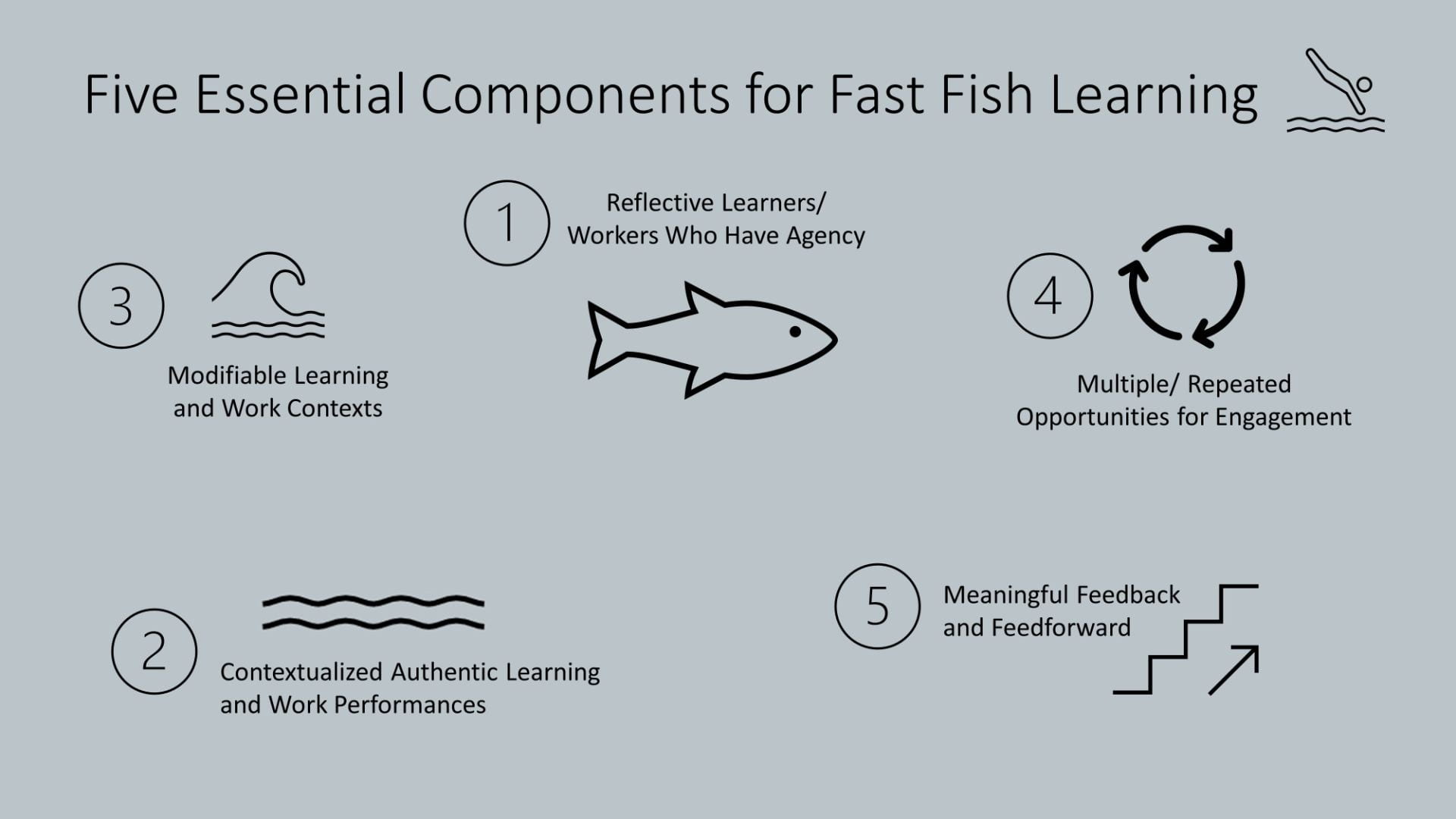“Letting someone create their own course of action and explain their reasoning for the decision that they made [is a way to increase agency].”
“[This suggests the importance of] supporting an atmosphere where folks can share the ways their minds work — sharing, discussing, and being open.”
“Feedback is not just about instructor-to-student feedback, but is instructor-to-student, student-to-student, student-to-self. We want students to start to assess their own learning and their own skill development so they can start to build their own plans for growing and learning both during our program and once they’re in the workforce.”
These were just some of the many insights that could be overheard as Workforce Development Practitioners and People Managers discussed the ways in which they support the development of Fast Fish Learners (FFLs) and what more they could do in recent Next Level Lab workshops. The workshops on January 31st and February 1st were the first in a series of deep dives in two strands, one for practitioners who design workforce development instruction and the other for people managers who guide people in their workplaces.
Fast Fish Learning is based on a metaphor that invites us to consider the power of contextualized agency in the workplace. Like fish that create eddies and vortices in the water to push off from to propel performance, workers who are agentive in their learning and work performance benefit from malleable contexts that they can actively adjust in support of their growth and performance. You can learn more about Fast Fish Learning in this research brief.
In the Workforce Development Practitioner strand, NLL Faculty Director Tina Grotzer presented five essential features of learning designs for supporting Fast Fish Learners/Workers. The contrasting background and experiences of the participants, scaffolded by the faming in the workshop materials, led to rich, grounded discussions about how these features might translate into actionable instructional moves that they can use in their work.
Do you want to learn more about each of the features? Read on for a summary of each along with insights from the participants. You can also access the workshop materials here. If you are interested in participating in future workshop series, see the information below about how to get involved.

Being a Fast Fish Learner (FFL) involves: 1) reflecting on how one’s mind works and feeling empowered to act on that knowledge, 2) having opportunities to learn and perform tasks in authentic situations, 3) seeing one’s learning and work contexts as malleable and being supported to make changes as needed, 4) having multiple chances to engage in and learn from a task, and 5) receiving specific, actionable feedback to inform future efforts. Here is how our workshop participants thought about these ideas in the context of their own practice:
Feature 1: Reflective Learners/Workers Who Have Agency
Being an effective learner in the workplace requires understanding and reflecting on how minds work in general as well as the unique aspects of how one’s individual mind works. This includes a consideration of the social, emotional, physical, and cognitive aspects of thinking and learning. FLLs must be empowered to act on those contexts to support their learning and performance. Workshop participants reflected on ways they are currently supporting reflective, agentive learning in their own work contexts and how they might push themselves further:
“Asking people to communicate how they like information provided to them and to provide feedback on how information is being communicated.”
“Active listening and reflective listening to then address needs and allow for students to better understand themselves.”
“Helping students to reflect by working through goal-setting processes and helping them compete with themselves and not with others. Helping them learn how to own their future.”
“Encourage the fine-tuning of learners’ and teammates’ minds — how do we make sure that our team can do that?”
Feature 2: Contextualized Learning/Work Performances
To be an effective FFL, opportunities must be available to perform learning and work tasks in authentic contexts. This entails practicing all the aspects of a new task with the support of a mentor who is engaged alongside them and can demonstrate more expert performance. Workforce development practitioners suggested strategies they have used, or would like to try, such as:
“Having checkpoints along the way during a project/task – the participant can explore their path, and it breaks things down into a series of manageable chunks.”
“Simulations, internships, and mock interviews with industry professionals.”
“We teach real-world processes and skills in a scaffolded way so that learners are able to practice, get feedback, revise, like the junior version to the whole version. We also utilize in our trainings the tools that learners would use in their internships, like Outlook, Slack, etc.”
Feature 3: Modifiable Learning/Work Contexts
Like fish pushing off vortices in the water, FFLs identify ways to “push off” of their contexts to improve learning and performance. This means that resources must be available for modifying the social, emotional, physical, cognitive, and technological contexts in the workplace, and that supervisors must support and empower these kinds of modifications. Practitioners in our workshop shared what this could look like in their organizations:
“We are working toward a place with our curriculum where students can make more choices about how and when they engage with the training content–desktop vs mobile for the online content; options for small group conversation/working groups, individual work, full cohort projects, peer to peer, etc. Right now, it’s pretty directed, but we want students to be able to make more of those choices in the future based on their own learning needs.”
“Depending on the needs of the team member, this might mean malleability with work schedules, adjusting hours and schedules to accommodate caring for parents, caring for kids, etc.”
“Encouraging imagination, creativity, flexibility to present information and get the job done.”
Feature 4: Multiple Opportunities for Engagement
FFLs take advantage of repeated opportunities to engage with tasks such that they can learn from failures and “up one’s game.” These repeated tasks should be complex enough to provide levels for progress across multiple engagements. Of course, “one-off” tasks are sometimes necessary, but when possible, they should be treated as opportunities to reflect upon what learning or assets from the task might transfer to new tasks. In reflecting on the learning designs in their own organizations, workforce development practitioners said:
“When classes are very large and diverse with varying backgrounds, how can we create more repetition for those who need it and fast pathways for those who don’t?”
“Most of our training is hands-on project based, and we build in a lot of opportunities for students to practice, get feedback, try again, etc. We also share content in multiple ways, both asynchronously and synchronously, so students can engage with new ideas and concepts multiple times.”
“We offer upskilling programs with prescriptive levels. Someone starts with a placement test and it categorizes their level of expertise as novice, proficient, expert, etc. The learners engage with self-paced learning and review the material once a week together, then they engage with a live instructor who covers the material needed to move up one level. The learners work in a hands-on lab to apply the knowledge. Then, they test again. Once someone tests out of the learning groups, we provide them with options, like a stretch assignment that uses the knowledge hands on and furthers strategic initiatives in the organization, or a certification program.”
Feature 5: Meaningful Feedback and Feed-Forward
FFLs will benefit most from repeated opportunities if they are given information about their performance that can be leveraged the next time they try the task. Feedback should be specific, actionable, and framed in ways that support learning paths toward greater expertise. Learners need time to reflect both on their immediate performance and on what they have learned about the nature of learning through their engagement in the task. Workforce development practitioners shared their approaches to meaningful feedback:
“When using performance evaluations, supervisor will take feedback from the previous evaluation and apply it to the current one so that learners can see the progression of improvement. They also work to map out next steps specifically.”
“Real and authentic conversations rooted in caring and not rooted in down talk.”
“Letting participants know the other side of what they envision. Let them know what possibilities exist, and let them decide what is best. It is a balancing act between self-advocacy and guidance.”
Do any of these strategies shared by our workshop participants resonate with you? What else might you try to support Fast Fish Learning in your own work context?
If you would like to get involved in future learning opportunities at the Next Level Lab, please fill out this interest form so that we can keep you updated on our upcoming events.
